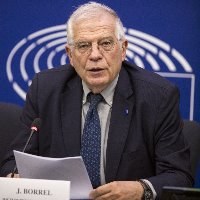(BRUSSELS) – The EU Commission withdrew part of the tariff preferences granted to Cambodia under the ‘Everything But Arms’ trade scheme due to “serious and systematic” violations of human rights principles.
The withdrawal of tariff preferences and their replacement with the EU’s standard tariffs (most favoured nation MFN) will affect selected garment and footwear products, and all travel goods and sugar. The withdrawal amounts to around one-fifth or 1 billion of Cambodia’s yearly exports to the EU. This will take effect on 12 August 2020 – unless the European Parliament and the Council object.
“The duration, scale and impact of Cambodia’s violations of the rights to political participation and to the freedoms of expression and association left the European Union with no other choice than to partially withdraw trade preferences,” said the EU’s foreign policy chief Josep Borrel: “The European Union will not stand and watch as democracy is eroded, human rights curtailed, and free debate silenced.” However, he also emphasised the EU’s “strong commitment to the Cambodian people, their rights, and the country’s sustainable development, and said that for the trade preferences to be reinstated, the Cambodian authorities “need to take the necessary measures”.
The Commission’s decision addresses the human rights violations that triggered the procedure, while at the same time preserving the development objective of the EU trade scheme. It recognises the need to continue to support Cambodia’s economic development and diversification of its exports. All emerging industries in Cambodia will continue to enjoy duty-free, quota-free access to the EU market. High value-added garments and certain types of footwear will also continue to enjoy duty-free, quota-free access to the EU market.
The Commission’s decision follows in-depth engagement with the Cambodian government and stakeholders. In particular, during the last twelve months, the Commission and the European External Action Service conducted fact-finding missions to Cambodia and held several meetings with the Cambodian authorities at both technical and political levels.
With regard to civil and political rights, the EU executive points out that there has been no significant progress since the launch of the EBA withdrawal procedure in February 2019.
It recognises the steps taken by the Cambodian authorities, notably in the areas of labour rights and land rights. Serious concerns remain however, including in particular the unresolved civil and criminal cases against trade unionists.
The government of Cambodia now needs “to re-open the political space in the country”, says the EU, to create necessary conditions for the re-establishment of a credible opposition and to initiate a democratic process of national reconciliation through genuine and inclusive dialogue. This includes the reinstatement of the political rights of the opposition members and the repeal/revision of laws, such as the Law on Political Parties and the Law on Associations and Non-Governmental Organisations.
The EU is Cambodia’s largest trading partner, accounting for 45% of Cambodian exports in 2018. Exports to the EU from Cambodia reached 5.4 billion in 2018, more than double the 2.5 billion recorded in 2013. 95.7% of these exports entered the EU market under EBA tariff preferences (i.e. 5.2 billion out of the 5.4 billion in total).
The EBA is one of the preferential trade arrangements under the EU Generalised Scheme of Preferences (GSP). It grants full duty-free, quota-free access into the EU market for all products except arms and ammunition for countries classified by the United Nations as Least Developed Countries. Access to these preferences comes with the obligation to respect human rights and labour rights.
Commission Delegated Regulation
EU procedure for withdrawal of trade preferences


